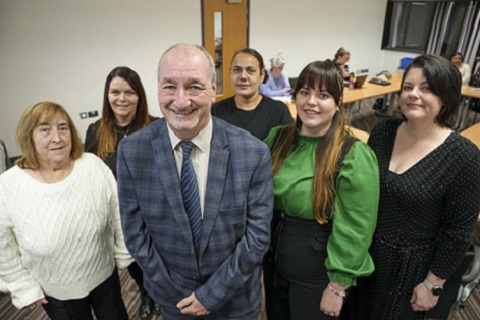A blue plaque is to be unveiled to mark the former home of the groundbreaking singer and performer Evelyn Dove, in the London Borough of Wandsworth.
Born in 1902 to Francis Dove, a London-based barrister from Sierra Leone and his British wife Augusta, the 1911 Census records Evelyn and her mother as living at 25a Barnard Road, Battersea, South London. Francis spent most of his working life in Ghana but maintained regular contact with his wife and daughter, supporting them financially.
The Census also shows Augusta and Evelyn as having a servant, which attests to the middle-class lifestyle they were accustomed to - common among Britain’s Black Edwardian population. Stephen Bourne, author of Evelyn Dove - Britain's Black Cabaret Queen, said: "Evelyn Dove defied convention.
“She was an adventuress who broke away from the constraints of her English middle-class background to tour Europe and become one of the most glamorous and charismatic entertainers of the jazz age. It is fitting that she should be honoured with a plaque." Following a private education Evelyn studied piano, elocution, and contralto at the Royal Academy of Music.
After graduating in 1919, she had hoped for a career in opera or the concert hall circuit but found the worlds of jazz and cabaret much more appealing. By the 1921 Census, Evelyn was performing with the Southern Syncopated Orchestra, a band comprising Caribbean, West African and African American musicians, widely credited for pioneering jazz in the UK and Europe. She then toured Europe, Asia, and America.
Evelyn achieved a number of firsts throughout the course of her life, but perhaps her most notable achievement was becoming the first woman of African heritage to be broadcast on BBC Radio, three years after its launch in 1925. She starred in various productions for the station during the ‘30s and ‘40s, and had her own music series, ‘Sweet and Lovely’.
In 1945 she hosted ‘Serenade in Sepia’ with Trinidadian folk singer Edric Conner which ran for forty-five weeks, proving so popular that it also aired on television. After the war Evelyn left the BBC to work in cabaret in India, France, and Spain. On her eventual return to the UK, work proved difficult to come by and she took odd jobs and worked as an understudy in a few productions, before securing stage and TV roles once more.
As she got older her work and health began to fade and she lost contact with her family. In 1972 Evelyn was admitted to a nursing home in Epsom, Surrey, where she died of pneumonia in 1987. To launch the 2023 BHM season in the UK, Nubian Jak Community Trust has partnered with the Sony Music UK Social Justice Fund with support from The Battersea Society to install the plaque at 25a Barnard Road, Battersea SW11 1QT on 29th September 2023 at 11:00am.
Charlotte Edgeworth, Director of Diversity, Inclusion and Social Impact at Sony Music UK, said: “Sony Music UK is delighted to support the creation of this plaque for Evelyn Dove, a trailblazing performer who wowed audiences across the world. Dove made revolutionary contributions to music and was the first woman of African heritage to be broadcast singing on BBC Radio.
“We’re so pleased she will be getting the recognition she deserves at the home where she once lived in Battersea.” The unveiling will be followed by a reception at Battersea Arts Centre Noon at 14:00.
Dr Jak Beula, CEO of the Nubian Jak Community Trust, said: “The Nubian Jak team is delighted to honour Evelyn Dove with a London blue plaque.
“The plaque will be the first ever to a woman of colour within the borough of Wandsworth.” In 1997 the historian Stephen Bourne became the custodian of her archive which he later included in a biography Evelyn Dove - Britain's Black Cabaret Queen published by Jacaranda Books in 2016.












